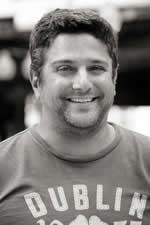
 Click the logo to download the Festival Author Booklet including excerpts and biographies.
Click the logo to download the Festival Author Booklet including excerpts and biographies. 
 Click the logo to download the Festival Author Booklet including excerpts and biographies.
Click the logo to download the Festival Author Booklet including excerpts and biographies.
Prologue:
Fall, 1996
Imagine Franky Benítez hiding on a subway platform in Boston and humming the song his father improvised twenty years ago outside a cinema in Santurce.
We love you, Franky.
Oh yes we do.
We love you, Franky.
We love you true.
When you’re not with me,
We’re blue.
Oh, Franky, we love you.
And as he hums, Franky Benítez enters a green trolley that cradles him back to his days of final comfort: August, 1976, the rear of a station wagon, sucking on a bottle of chocolate milk.
His abuelo drives. His mother smokes. A week had passed since the judge formally decreed his parents’ divorce, and now here was Franky Benítez, his mother and his baby sister, three passengers checking into Eastern Airlines Flight 17 nonstop to El Bronx, Nueva York.
On the road to the airport, men shout, hawking fruits and fried meats. The traffic crawls. His mother lights up, smoke creaks out the window of the station wagon, flowing past the condominiums, past the beach and into the Caribbean. Once, she thinks, this island of Puerto Ricans and Americans, blacks, blondes and those in between, Cuban exiles and Dominicans, enchanted her with a home where kids played in pools and parents danced all night. But now? Seven years had passed, and her seven-year-old son, her prince, her Franky, still drank chocolate milk from a baby’s bottle.
Right then Franky Benítez climbs over the back seat of the station wagon, careful not to kick his baby sister, who sleeps on a blanket and seatbelts. As he sees his mother smoke away tears, he leans over and kisses her on the cheek.
“Mamita, when I get back to Puerto Rico, I want to help you paint the house, okay?”
Think of how the green trolley stops at Boylston Street, and how others jolt silent curses. Behind a line of B trains, and C trains and D trains, the trolley halts. Franky turns to see the dim Boylston station. It had changed very little since college—the still gray, the rusty green, the old Chinese woman sitting on the middle bench, clutching to shopping bags full of soda cans, teenagers smoking in back corners, vagrants lingering near the token booth. Maybe a hundred years ago, when this city was smaller and people were amazed that you could go from one end of Boston Common to the other in an electric car, maybe then the Boylston stop made sense. But now, who gets off at Boylston Street?
Franky Benítez had figured it all out, and when he calculated the numbers, he felt like a Rain Man: people who like routine, read the Globe for 50 years and buy the same cup of coffee from the same corner store in some part of Fields Corner or Jamaica Plain or Somerville. The same people take the same train every day for 520 days a year, give a holiday or two, 5,200 days a decade, 26,000 a half-century, 52,000 days a century. And as he waits, Franky figures, if 100 people took the same train for 46 years, they would be in that train 2,392,000 times.
The trolley moves. Relief? Escape? Security? It’s only work, a place to drain his time. Now imagine this scene: the trolley moves, the people cheer. The trolley accelerates, Franky begins to holler. He jumps to the front and begs the conductor to barrel-ass all the stops: Arlington, Copley Square, Hynes Convention Center, Kenmore Square, all the way to Cleveland Circle, where the trolley combusts and all the grief, the tedium, the anxiety vanishes and Franky Benítez is at peace again.
***
About Julio Ricardo Varela
Julio Ricardo Varela is a writer and new media journalist and graduate of Harvard, with over twenty years of experience in educational publishing (former VP of Reading and ELL/Bilingual for Houghton Mifflin Harcourt), journalism (former reporter for The Boston Globe), and social media marketing (clients includeFernandoVarela.com). One of the country’s leading thought leaders on Latino social media, he recently appeared on CBS’ “Face the Nation” to discuss the Latino vote in the 2012 election and has also been featured on CNN in America.
Julio founded a bilingual new media company called“Latino Rebels,” where he works with twenty of the country’s edgiest Latino social media influencers, journalists and writers to produce content and deliver targeted campaigns for companies. His personal blog has generated major interest for its insights on Puerto Rican politics and his novel Franky Benítez will be published in 2012. A native of San Juan, Puerto Rico and a former resident of the Bronx, Varela now calls Boston home.